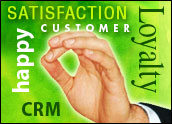
How do you standardize trouble-ticket handling over e-mail and phone for 370,000 full- and part-time students? If you’re Minnesota State Colleges and Universities (MSCU), you opt for hosted CRM software.
On-demand CRM vendor RightNow Technologies has announced that MSCU — a system created by Minnesota’s state legislature and separate from the University of Minnesota — has selected its hosted CRM offering.
MSCU includes 25 two-year colleges and seven state universities, totaling 53 campuses in 46 communities.
Replacing Unicenter
The new software already is handling e-mail and telephone trouble tickets for MSCU’s enterprise software, Integrated Statewide Records System (ISRS) — a homegrown suite built in the 1990s to handle everything from HR and finance to student accounting and Web applications, plus more recently purchased off-the-shelf software.
MSCU formerly used Unicenter Service Desk from Computer Associates. “While Unicenter had excellent features — it’s a very robust system — it wasn’t one we thought would be the best fit in our student-oriented world,” Joanne Chabot, deputy CIO of MSCU, told CRM Buyer.
Finding a Fit
Particularly because MSCU includes not only part-time and full-time students, but also professors, training needs to be kept to a minimum, Chabot noted. “We need to put in front of them tools that are intuitive for them and very easy to use.”
RightNow also offers a hosted model, whereas CA does not. “We have an extremely complex technical environment,” Chabot said. “We’re adding servers — every time I turn around, something new comes into the regional centers, and we wanted to take any opportunity to have a service managed for us.”
Once RightNow goes live at MSCU, users who have a problem with the ISRS system will be presented with in-context information to help them solve it. “We’re hopeful it will reduce 25 to 33 percent of our calls and tickets by directing them to the right knowledge,” Chabot said. If a user still generates a trouble ticket, RightNow will track it to its resolution.
The Big Picture
MSCU’s switch to hosted software is not an isolated occurrence. Driven by hosted-CRM providers, such as RightNow and salesforce.com, “the whole CRM space is now being turned on its head,” noted Alex Kwiatkowski, a senior consultant with London-based analyst firm Ovum. “To illustrate that, Siebel [has] now launched [its] own hosted service.”
Contrasted with horror stories of years-long or abandoned CRM enterprise software rollouts, a hosted CRM installation can be rolled out in “days, if not hours,” Kwiatkowski told CRM Buyer.
Today’s hosted CRM software also has overcome the scalability issues that once relegated it to use by small and midsize businesses. “The original story behind hosted or ASP services was that they were going to be the preserve of small business — they would allow people that didn’t have deep pockets to get services they couldn’t afford,” Kwiatkowski said. Now, he added, “you can have a lot of the flexibility and functionality [of enterprise CRM software], but have it on a hosted model — away from your premises, and it’s scalable.”
Flexibility Everywhere
That flexibility applies to more than just the Web.
“The other beauty of RightNow and some of the other providers is the fact that it’s consistency across channels,” Kwiatkowski noted. “It’s not just all down the voice route, or e-mail and Web collaboration — in other words, not a silo mentality. It’s about the knowledge base looking across channels.”
As a result, such software can help customers save time and energy by providing consistency, “and it gives companies and institutions the ability to do what they need to do — serve their customers — at a price they can afford.”
Beta-Testing Stage
Chabot said MSCU already has migrated to RightNow internally to track trouble tickets and is beta-testing other functionality, although it has not announced a general release date. Her team is still targeting complex parts of the implementation — which it has identified based on users’ trouble-ticket generation patterns — and is authoring content to help users get past those trouble spots.
“We’re still populating the knowledge base, and we anticipate that will take another three or four months, in between everything else, and potentially even longer,” she said. In the end, she plans to launch with a bang — and given the success of hosted CRM to date, that goal seems to be within reach.
















































Social CRM
See all Social CRM